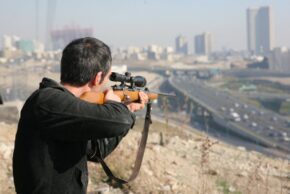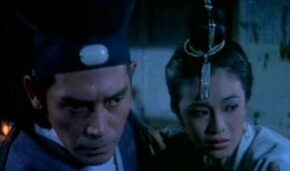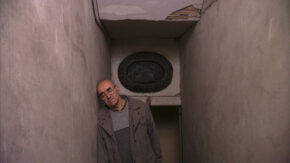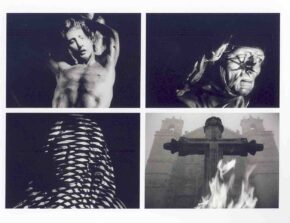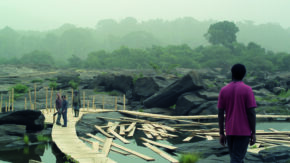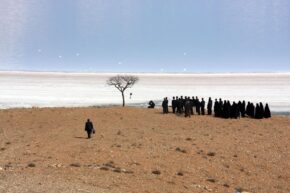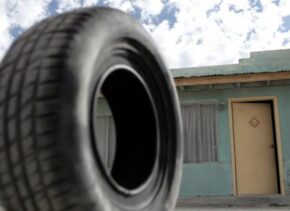CS46
The Hunter (Rafi Pitts, Iran)
By Jonathan Rosenbaum | 03/16/2011 | CS46, Currency, From Cinema Scope Magazine
By Jonathan Rosenbaum Underneath the Persian credits, over heavy metal music, the camera roams around inside a colour photograph, grazing over pointillist surfaces and male faces—finally pulling back to reveal the Islamic Revolution Guard Corps in 1983, getting ready to drive their motorcycles over a huge replica of the American flag on the pavement in…
Read More → Road to Nowhere (Monte Hellman, US)
By Quintin | 03/13/2011 | CS46, Currency, From Cinema Scope Magazine
By Quintín A couple of months ago, I watched Monte Hellman’s Two-Lane Blacktop (1971) on TV. The film is marvellous for more than one reason (not just great, but truly marvellous). Among other things, it’s a correction of Easy Rider (1969), the juvenile blockbuster made a couple of years earlier. The proof that things are…
Read More → Web Only | DVD: A Glance at North Korean Cinema
By Jerry White | 03/12/2011 | CS46, Web Only
By Jerry White “Depicting the typical man of the new era means creating images of people who live, work and struggle with the conviction that they are masters of the revolution and the work of socialist construction…Stressing this principle of Chajusong and creating human images based on the concept of Juche allows literature to make…
Read More → Web Only | Books Around: Picking Up
By Olaf Moller | 03/12/2011 | CS46, Web Only
By Olaf Möller Festivals, the bigger ones at least, are among the last bastions of subsidized non-academic film publication. Traditionally, important or marginal retrospectives were accompanied by nice books or at least representative pamphlets authored usually by journalists—folks who knew how to build up an interest for something, keep the masses flowing into the venues…
Read More → Film/Art | There’s No Place Like Home: Absalon, Aitá, and Ocaso
By Andrea Picard | 03/12/2011 | Columns, CS46, From Cinema Scope Magazine
By Andréa Picard “These homes will be a means of resistance to a society that keeps me from becoming what I must become.”—Absalon “In Basque mythology the house or etxe is a sacred area where the living and the dead meet on equal terms.”— José Maria De Orbe The Israeli-born, Paris-dwelling sculptor Absalon chiselled his…
Read More → DVD: José Val del Omar’s Tríptico Elemental and Other Experiments from Spain
By Matt Losada | 03/12/2011 | Columns, CS46, From Cinema Scope Magazine
By Matt Losada For most cinephiles the mention of Spanish experimental film conjures an abyss, from which the only images to readily appear are of Buñuel’s (Paris-made) Un chien andalou (1927) and L’Age d’or (1930), and the rural documentary Las Hurdes (1933). It is often said that Buñuel had to leave Spain to make avant-garde…
Read More → Mildred Pierce’s Bitter Tears
By Richard Porton | 03/12/2011 | Columns, CS46, From Cinema Scope Magazine
By Richard Porton In “The Boys in the Back Room,” a famous essay written in 1940, Edmund Wilson damned James M. Cain’s work with faint praise by referring to the hard-boiled novelist as a “writer for the studios” whose “novels are produced in his off-time…they are a kind of Devil’s parody of the movies.” Yet…
Read More → CS46 Editor’s Note
By Mark Peranson | 03/12/2011 | Columns, CS46, From Cinema Scope Magazine
The Cinema Scope Top Ten of 2010 1. Uncle Boonmee Who Can Recall His Past Lives (Apichatpong Weerasethakul) 2. The Autobiography of Nicolae Ceaucescu (Andrei Ujica) 3. Mysteries of Lisbon (Raúl Ruiz) 4. Film Socialisme (Jean-Luc Godard) 5. Winter Vacation (Li Hongqi) 6. The Strange Case of Angelica (Manoel de Oliveira) 7. I Wish I…
Read More → Worlds of Possibilities: Christian Petzold, Dominik Graf, and Christoph Hochhäusler’s Dreileben
By Dennis Lim | 03/12/2011 | CS46, Features, From Cinema Scope Magazine
By Dennis Lim After a decade-long procession of HBO critical darlings, in the wake of Olivier Assayas’ Carlos and now Todd Haynes’ Mildred Pierce, received wisdom holds that television—or more precisely, its funding structures and serial configurations—represents our best hope for narrative filmmaking. Such pronouncements tend to assert the benefits of duration and scope, the…
Read More → Berlin 2011 | Not Political Cinema: Ulrich Köhler’s Sleeping Sickness
By Mark Peranson | 03/12/2011 | CS46, Festivals, From Cinema Scope Magazine
By Mark Peranson The gleeful bloodsport of Berlinale-trashing by journalists has reached the point where it’s hard not to defend the honour of the weary, bloated festival—complaining about the quality of the Competition is like beating a dead bear, or, in the case of this year’s runner-up, flogging a dying horse. So, for the seasoned…
Read More → The Party’s Over: 2010 in TV
By Adam Nayman | 03/12/2011 | CS46, Features, From Cinema Scope Magazine
By Adam Nayman First things first: the funniest and probably finest episode of television produced in 2010—on par with much the Americans produced last year for the cinema—was “Steve Guttenberg’s Birthday,” the highlight of the second (and final) season of Party Down. Of all the great things about this series following a Hollywood catering company…
Read More → When the Salt Attacks the Sea: The Films of Mohammad Rasoulof
By Michael Sicinski | 03/12/2011 | CS46, Features, From Cinema Scope Magazine
By Michael Sicinski The Islamic Republic of Iran v. Jafar Panahi and Mohammad Rasoulof: A Developing Story Over the past month, there have been a number of promising indications that the heinous, unjust situation in which Iranian filmmakers Mohammad Rasoulof and Jafar Panahi are ensnared might change. Although at this point most members of the…
Read More → The Important Element of No Reason: The Mad World of Quentin Dupieux’s Rubber
By Jason Anderson | 03/12/2011 | CS46, From Cinema Scope Magazine, Interviews
By Jason Anderson The scene begins as a tableau familiar from a million movies about killers on lonely desert highways. Their khaki-coloured subordinates visible as heat-hazy shapes in the background, two serious-looking men in sheriff uniforms cast their gazes down at something below the edge of the frame. By rights, they should be looking at…
Read More → Interview | The Thinking Image: Fred Kelemen on Béla Tarr and The Turin Horse
By Robert Koehler | 03/12/2011 | CS46, From Cinema Scope Magazine, Interviews
By Robert Koehler An aging, partially disabled father and his loyal, hard-working daughter endure six days and nights of a fierce windstorm in their lonely farmhouse while their horse—their means of sustenance—gradually loses its will to work or eat. This could be the stuff of a play, but Béla Tarr’s The Turin Horse consciously contains…
Read More → Interviews | The Inmost Leaf: An Interview with Nathaniel Dorsky
By Max Goldberg | 03/12/2011 | CS46, From Cinema Scope Magazine, Interviews
By Max Goldberg Our age does not really merit the richly endowed materiality of Nathaniel Dorsky’s short films, and yet they now arrive with greater frequency than at any other point during his many decades at work. His lyrical gifts were apparent from an early age—A Fall Trip Home (1964), made when he was only…
Read More → 
